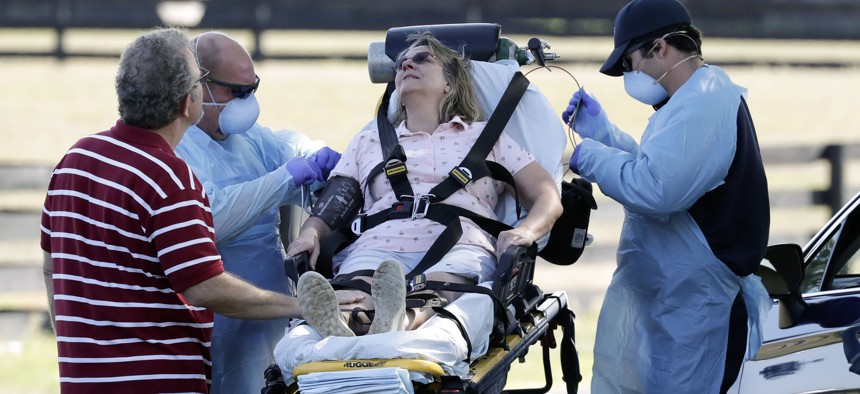Nearly 200 Cities Short on Supplies for Dealing With Coronavirus, Mayors Report

Medical personnel treat a woman shortly after she arrived at a coronavirus mobile testing site Monday, March 23, 2020, in The Villages, Fla. She was later transported to a medical facility by ambulance. (AP Photo/John Raoux)

Connecting state and local government leaders
The U.S. Conference of Mayors says new survey findings show shortages of essential items have reached “crisis proportions.”
Cities across the U.S. are woefully short on protective equipment for first responders and other supplies needed for dealing with the coronavirus outbreak, according to a survey of dozens of mayors that was released on Friday.
The results—based on responses from officials in 213 cities in 41 states—show that 192 of the cities, or about 90%, do not have adequate supplies of face masks for first responders and medical staff, while 186 lack other types of personal protective equipment for those workers.
Likewise, 186 of the respondents reported that they were short on kits to test people for the virus and 164 said they don’t have enough ventilators in health facilities.
In addition to items like masks and other protective gear, survey respondents said they needed goods like disinfectant sprays and wipes, hand sanitizer, no-touch thermometers, portable hospital beds, soap, bleach, hand-washing stations and other equipment.
The survey was conducted between March 20 and 24 by the nonpartisan U.S. Conference of Mayors. Populations in the cities included in the results ranged from under 2,000 to 3.8 million.
“The shortage of essential items … has reached crisis proportions in cities across the country,” the group’s CEO and executive director Tom Cochran wrote in a report on the findings.
“The result is that the safety of city residents and the health workers and first responders protecting them is being seriously compromised,” he added. “Despite their best efforts, most cities do not have and cannot obtain adequate equipment and supplies.”
Estimates included in the report indicate that cities need at least 28 million face masks, 7.9 million test kits and 139,000 ventilators—a crucial piece of medical equipment for people who are struggling to breathe because of the respiratory illness that the virus causes.
Complaints and concerns about supply shortages—especially ventilators and protective wear for front-line health care workers in hospitals—have been widespread since the virus took hold.
A March 16-20 survey of 260 health systems, representing roughly 20% of the nation’s total hospitals, found that shortages of supplies in hospitals had grown worse since late February.
In that survey, hospitals ranked dwindling supplies of the N95 respirator masks that healthcare workers rely on for protection as a top concern.
Many systems had less than 10 days of N95 mask inventory, according to Premier, the company that conducted that poll. Respondents also reported adopting conservation measures for protective equipment like having staff reuse masks (40%), or using expired ones (33%).
About 20% of respondents reported needing additional ventilators immediately, and around a quarter said they had less than two week’s worth of hand sanitizer.
In New York, where New York City has become a national epicenter for the virus outbreak, Gov. Andrew Cuomo said earlier this week that the state had procured about 7,000 ventilators, but needed, at a minimum, an additional 30,000 of them.
Vice President Mike Pence said Thursday that the federal government had distributed more than 9 million N95 masks, as well as 20 million surgical masks, 6,000 ventilators, and millions of protective gloves, gowns and face shields.
President Trump on Twitter on Friday was calling on automakers to produce ventilators.
But the night before on Fox News he questioned Cuomo’s request. “I don’t believe you need 40,000 or 30,000 ventilators. You go into major hospitals sometimes, and they’ll have two ventilators,” Trump said.
On Friday, Cuomo emphasized that he is pushing for ventilators to deploy to hospitals when the New York cases reach a peak. Experts have calculated the state at that point could need a total of 40,000.
“You will see, as numbers increase, hospitals reaching capacity,” the governor said.
“Everybody is entitled to their own opinion,” Cuomo added. “But I don’t operate here on opinion. I operate on facts and on data and on numbers and on projections.”
An article that The New England Journal of Medicine published online this week said that there are a broad range of estimates for how many ventilators the nation will need as it battles the virus. These range from several hundred thousand to as many as a million.
The article says that current estimates of the number of ventilators in the United States range from 60,000 to 160,000.
It also points out that the nation’s current medical equipment supply shortages have multiple causes, including problems with the global supply chain. Before the pandemic, the article notes for instance, China produced approximately half the world’s face masks.
The U.S. Conference of Mayors sent a letter, signed by 303 mayors, to congressional leaders last week, urging them to provide $250 billion in direct and flexible emergency funding to cities, to help them deal with the economic and budgetary fallout from the pandemic.
“While cities are doing everything they can, we need support from our state and federal leaders,” the conference’s current president, Bryan K. Barnett, mayor of Rochester Hills, Michigan said in a statement.
He added that the new survey confirms “what mayors already know to be true: we need adequate resources to end this pandemic.”
OTHER STORIES on Route Fifty:
-
‘We’re Doing What We Can’: How a Makeshift Network Is Filling in the Gaps with Medical Supplies
-
Some States Stall Plastic Bag Bans During Coronavirus Outbreak
-
Trump Signs Coronavirus Aid Package—But Democrats Say More Help Needed for States and Cities
-
$60 for Toilet Paper? How Attorneys General Are Fighting Price Gougers

NEXT STORY: ‘We’re Doing What We Can’: How a Makeshift Network Is Filling in the Gaps with Medical Supplies



